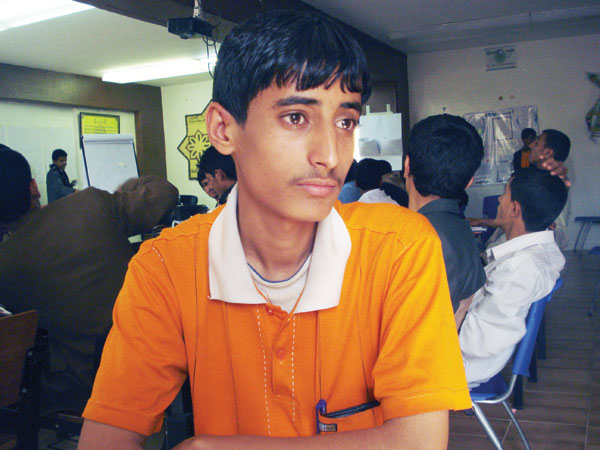[vc_row][vc_column width=”1/1″][vc_column_text]
YEMEN:
History and Language Classes Transform At-Risk Tribal Youth in Yemen’s Troubled North
[/vc_column_text][/vc_column][/vc_row][vc_row][vc_column width=”2/3″][vc_column_text]
“I used to hate history because teachers were so rough,” Ahmed Munif now says. “But this course is different.”
Until recently Ahmed Munif, 21, never appreciated the nature of the ancient dam located near the house where he grew up. A native of the Ma’rib Governorate of Yemen and a high school graduate, he nonetheless had no idea of the historical significance of a structure that he had long taken for granted.
Located in the valley of Dhana, the current Ma’rib dam was built near the ruins of the old Great Dam located a few kilometers from the ancient city of Ma’rib, capital of what many archeologists believe was the Old Testament Sab’a or Sheba. The ancient Sabaens may have constructed the dam as early as 1,750 BC, to capture the periodic monsoon rains that drenched the region during the wet season. Today it is a dusty, dry and violent place—one that bears little resemblance to the once flourishing agricultural centre of what Herodotus once described as Arab Felix or Happy Arabia.
Although the Ma’rib Governorate is scattered with historical sites, most Yemenis remain unaware of their rich and mysterious past. Fewer still know how to mobilize such knowledge into earning a living. When interviewed for this article, Munif was actually lounging on an ancient stone while chatting with a group of friends. He had no idea what he was sitting on nor that his hometown of Ma’rib was once a prosperous metropolis and the home of King Solomon’s royal peer, the famed Queen of Sheba.
He soon discovered the truth however, thanks to a USAID-funded course that offered 120 at-risk youth an opportunity to explore the history of Yemen—both ancient and Islamic. The Al-Khair Organization, a local Yemeni NGO, implemented the program through a grant offered by the USAID-funded Community Livelihoods Project (CLP). The aim was to inculcate participants with the life skills training necessary to help them find jobs while, at the same time, helping to stabilize a governorate renowned for its hard-bitten inhabitants. “I used to hate history because the teachers were so rough,” Munif now says. “But this course was different.”
Before he took the Yemen History course, Saddam Hussein, 24, an oil engineer graduate, was also unaware that a carved stone squatting in the yard of his house had come from a nearby archeological site. “So I took it and cleaned it up and called the tourism office to take it.”
Hussein also believed that the trenches surrounding historical sites were constructed by the Yemen government to prevent others from using the land. “We did not know the reason is to protect these sites,” he adds. In Yemen, the Ma’rib Governorate is perceived as a difficult region—plagued by a toxic combination of poverty, illiteracy, hijacking, kidnapping and terrorism. It is also hornet’s nest of tribal tensions and an Al Qaeda in the Arabian Peninsula (AQAP) stronghold. High unemployment rates means that Ma’rib is fruitful recruiting territory for terrorist organizations and criminal gangs intent on using young men as traffickers, gun smugglers, kidnappers or general thugs-for-hire. As a result, Yemenis living in other governorates stigmatize those from Ma’rib as rough, tough and dangerous to know.
Hussein recalls heading out with friends to scare the tourists who came to imbibe the atmosphere of Ma’rib’s ancient past while engaging in a bit of harmless recreation. “When I saw foreigners swimming in the Ma’rib Dam, I used to go with my friends to shoot in the air to scare them out,” he says.
Today, armed with newly found knowledge and pride in his community, Hussein welcomes the presence of foreigners. Last month, he drove a British geologist to the Ma’rib Dam and eagerly shared what he knew about its historical significance.
“I feel that they (foreigners) are people like us. The only difference is with religion,” he notes. Since then Hussein has become a tourist guide, shepherding groups of visitors around his city and showing them the sights.
The change of Hussein’s attitude seems to be contagious. He lectures on Yemen’s history to primary school students in his neighborhood. “I feel that the students are listening and that I don’t know a few only a courses of history but entire volumes,” says Hussein. One fifth-grade student even asked Hussein if he could help with the upkeep of ancient sites.
Richard Beeler, the former Director of the Sana’a-based English Language Center, says he could initially identify new trainees from a distance. They not only stood out because of their tribal dress, but also were self-conscious and shy. Course work and interaction with other students, American and Yemeni instructors however, worked its magic and eventually they learned to mingle with ease.
“It was a very remarkable idea to encourage youth from remote villages to come to study in Sana’a,” notes Shihab Al Midwahi, a senior officer from the Lebanese University that offered English courses to the students. “There were notable transformations in their behavior; the way they spoke with others, their preconceived ideas about a lot of issues. They have really changed.”
Says Abdul-Rahman al-Shater, 19, from Ma’rib “In the past, we used to think that English and these courses are for other people not for us, they said. The training has also reorganized their priorities. “In the past, my priority was money, now it is knowledge.” “I used to be very nervous and would violently react to trivial events,” said Hamzah Abdul-Rahman, 23, also from Ma’rib. “Now I know that being educated is far more powerful than being armed.”
—Patricia Leidl[/vc_column_text][/vc_column][vc_column width=”1/12″][/vc_column][vc_column width=”1/4″][vc_widget_sidebar sidebar_id=”sidebar-primary”][/vc_column][/vc_row]